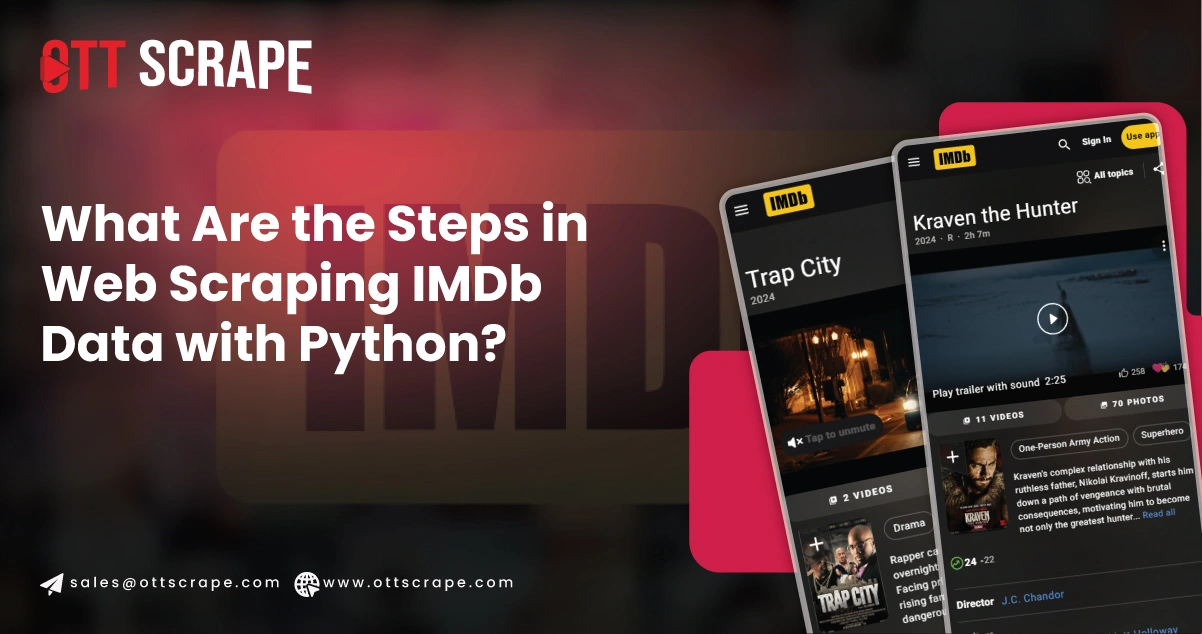
Introduction
Web scraping is a technique used to extract data from websites by simulating human browsing behavior. It's a critical tool for anyone involved in data collection, especially when no API is available, or the data needs to be simplified for traditional extraction methods. One of the most popular websites for movie data is IMDb (Internet Movie Database). IMDb offers a wealth of information about movies, TV shows, actors, ratings, and reviews. For developers, analysts, and data scientists, Web Scraping IMDb Data with Python is an invaluable way to gather and analyze large volumes of movie-related information.
This article will explore how to scrape IMDb Data using Python. We will walk through the necessary tools and the structure of IMDb and provide a detailed, step-by-step tutorial for building an IMDb Data Scraper that extracts movie data from IMDb.
Significance of Scraping IMDb Data with Python
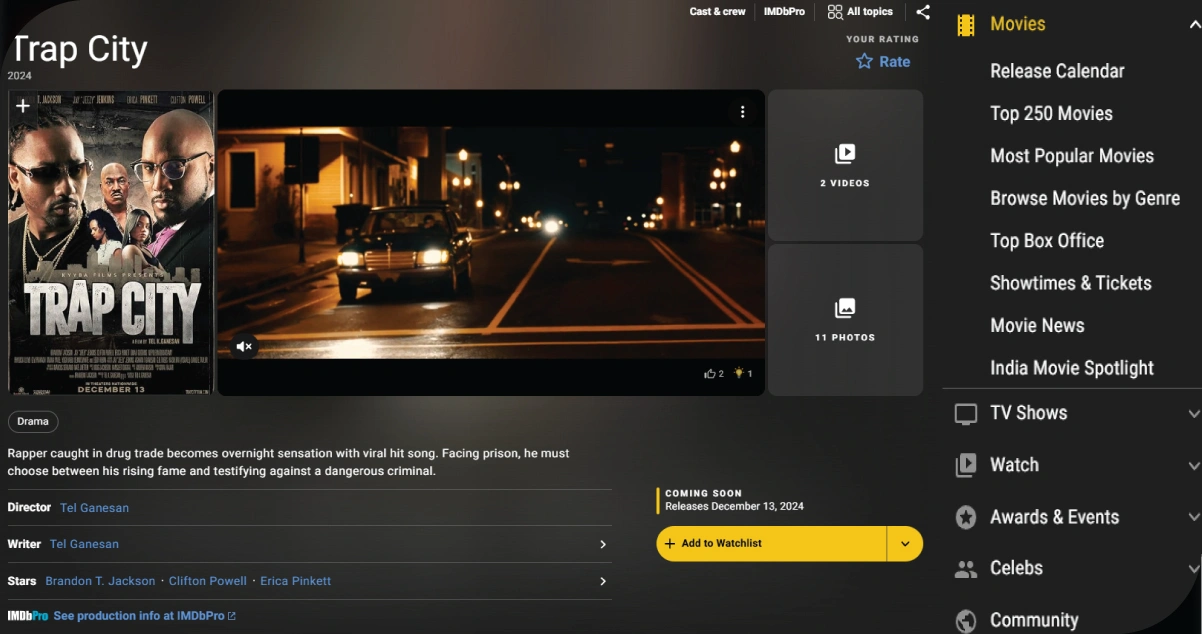
Scraping IMDb data with Python provides access to a vast array of movie-related information, enabling automated data collection, personalized recommendations, in-depth analysis, and market insights. This process is essential for businesses, researchers, and developers seeking comprehensive, up-to-date entertainment data.
- Access to a Wealth of Movie and TV Data: IMDb contains an extensive database of information related to movies, TV shows, actors, directors, ratings, and reviews. Scrape IMDb data with Python to access valuable insights that would otherwise be difficult to gather manually. This includes detailed data on movie release years, genres, ratings, box office earnings, and actor/crew information. Having this data allows analysts, researchers, or developers to build comprehensive datasets for various applications such as sentiment analysis, trend identification, or movie recommendation systems.
- Automation of Data Collection for Large-Scale Projects: Collecting IMDb data for many movies or TV shows can take time and effort. Python's web scraping capabilities allow for the automation of this process, making it easier to gather data on a large scale. Automated scraping can be scheduled to periodically extract the latest movie information, ensuring that databases remain up-to-date. For instance, researchers building datasets for machine learning algorithms can continually gather fresh data to improve model accuracy or performance. Many companies offer IMDb Data Scraping Services to streamline and scale this process efficiently.
- Customization of Data Extraction for Specific Needs: Scraping IMDb with Python allows users to tailor the data extraction process to their needs. Instead of relying on predefined datasets or APIs, which may offer limited or fixed data, Python scraping scripts can be customized to target specific attributes of interest, such as a movie's box office earnings, the director's biography, or the average rating over time. This flexibility helps users gather highly relevant data for niche applications, such as analyzing specific genres or comparing the performance of actors across different movies. IMDb Data Extraction allows for this level of customization, ensuring that the data gathered meets the user's exact requirements.
- Enhanced Data for Movie Analysis and Research: For data analysts, academic researchers, or even hobbyists in the film industry, scraping IMDb data is essential for conducting in-depth analysis. With Python, users can extract IMDb data for information related to movie ratings, reviews, cast performance, and trends across various genres or periods. Such analysis can provide valuable insights into factors that contribute to a movie's success or failure, public reception, and the evolution of film and television over the years. This can be used for predictive modeling, market research, and content creation for streaming platforms or movie studios.
- Building Personalized Movie Recommendation Systems: By scraping IMDb data with Python, developers can build personalized movie recommendation systems based on user preferences. By collecting data on movie genres, ratings, and user reviews, a recommendation engine can suggest movies that align with a user's tastes. For instance, if a user consistently rates action movies highly, the system can use this data to recommend similar films from IMDb's vast catalog. IMDb Data Collection enables the gathering of such information. At the same time, Python's data processing libraries, like Pandas and sci-kit-learn, can be integrated to enhance the system's performance and ensure accurate and relevant recommendations.
- Competitive Analysis and Market Insights: Scraping IMDb data can provide valuable market insights by analyzing trends in movie ratings, popularity, and audience sentiment. This is particularly useful for businesses involved in the entertainment industry, such as streaming platforms, film studios, or content distributors. By analyzing IMDb data, companies can gauge audience preferences, track the performance of specific actors or directors, and predict future trends in the industry. For example, by tracking movies with consistently high ratings or examining patterns in box office performance, businesses can make data-driven decisions about which films to invest in or promote. Web Scraping IMDb Data is an effective method for obtaining this crucial information.
Tools Required

To scrape data from IMDb with Python, the following tools and libraries are essential:
- Python: The primary programming language for web scraping.
- BeautifulSoup: A Python library that easily scrapes information from web pages.
- Requests: A library to send HTTP requests to websites.
- Pandas is an excellent library for data manipulation and analysis. It can store the scraped data in a tabular format.
- User-agent headers are necessary for mimicking a real browser, as IMDb may block requests that look like they are coming from bots.
- Regex: Regular expressions are used to clean or parse data more refinedly.
Setting Up the Environment
To start, we'll need to install the required Python libraries. You can install them using pip:
pip install requests beautifulsoup4 pandasOnce the libraries are installed, we can proceed with the scraping process.
Understanding the Structure of IMDb

IMDb is organized into several pages containing information about movies, TV shows, actors, and more. A typical IMDb movie page contains details such as:
- Title
- Year of release
- Genre
- Director
- Actors
- Ratings
- Number of votes
- Synopsis
We will scrape a movie's page for this data and store it in a structured format for analysis. For example, a URL like:
https://www.imdb.com/title/tt0111161/ # The Shawshank Redemption represents the page for The Shawshank Redemption. Our scraper will extract relevant data from this page.
Step-by-Step Guide to Scrape IMDb Data
⦁ Send HTTP Request to IMDb
The first step in scraping data from IMDb is to send a request to the movie page. The requests library in Python is ideal for this purpose.
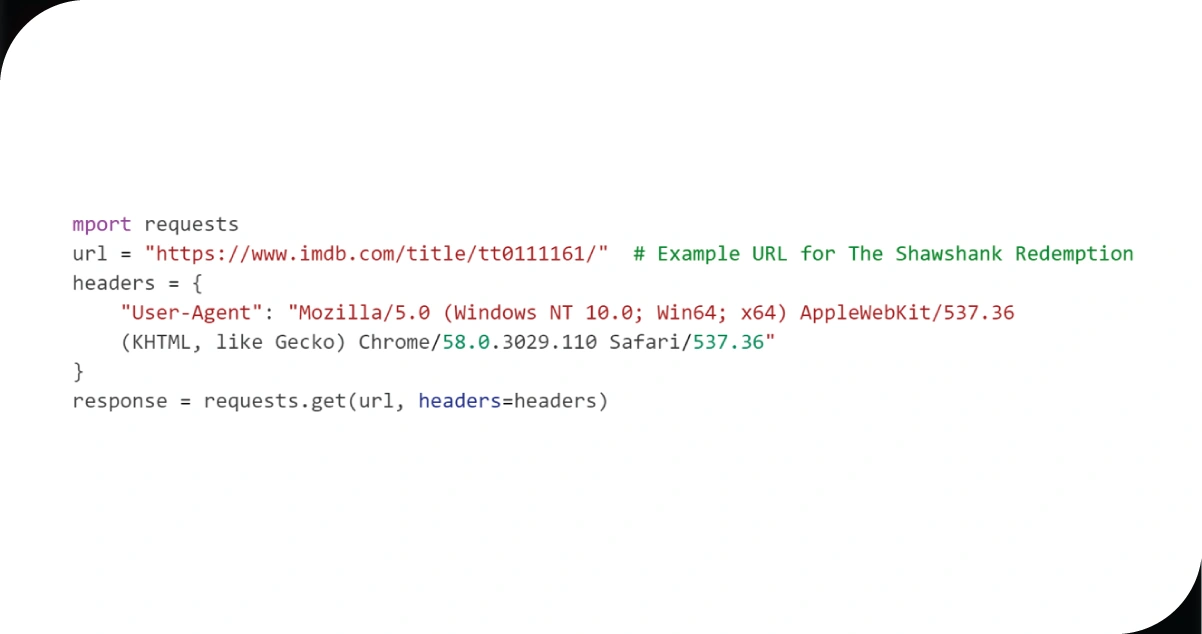
Here, we specify a User-Agent header to avoid being blocked by IMDb, which might reject requests that don't look like they're from a legitimate browser.
⦁ Parse the HTML Content with BeautifulSoup
Once we've sent the request and received a response, the next step is to parse the HTML content. This is where BeautifulSoup comes in handy.
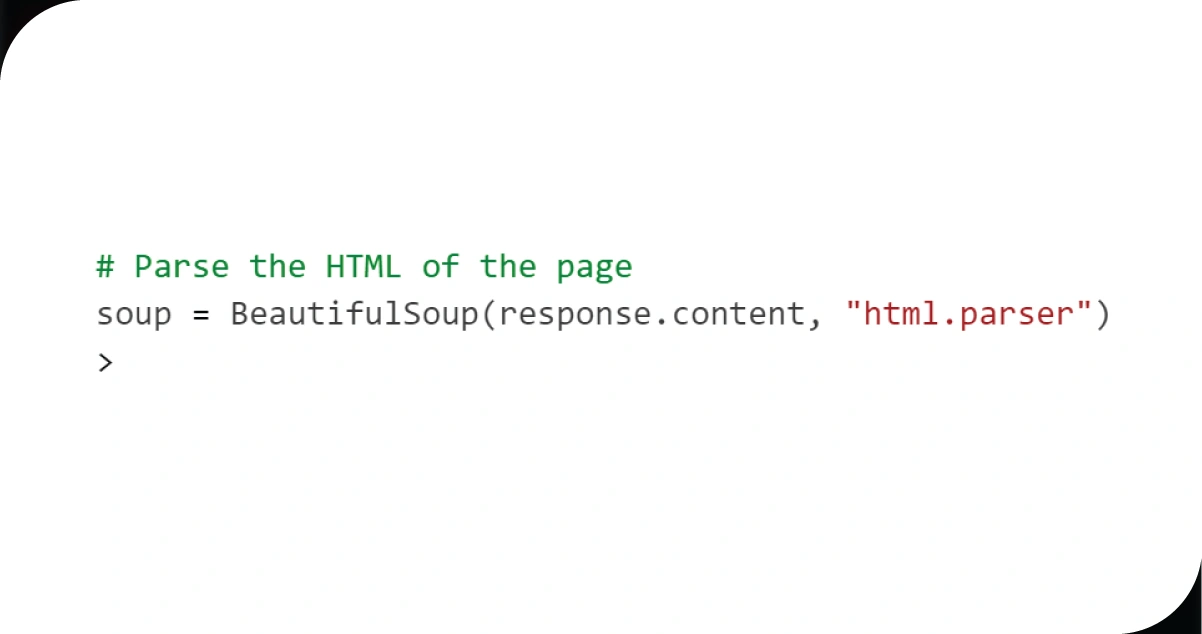
Now that we have the soup object, we can search the page for the needed data.
⦁ Extract Movie Details
IMDb pages have a specific structure, with each piece of data embedded within HTML tags with unique identifiers. For example, the movie title is inside an h1 tag, and the release year is typically within a span tag with a class sc-16ede64e-2. We'll use BeautifulSoup's find or find_all methods to extract this information.
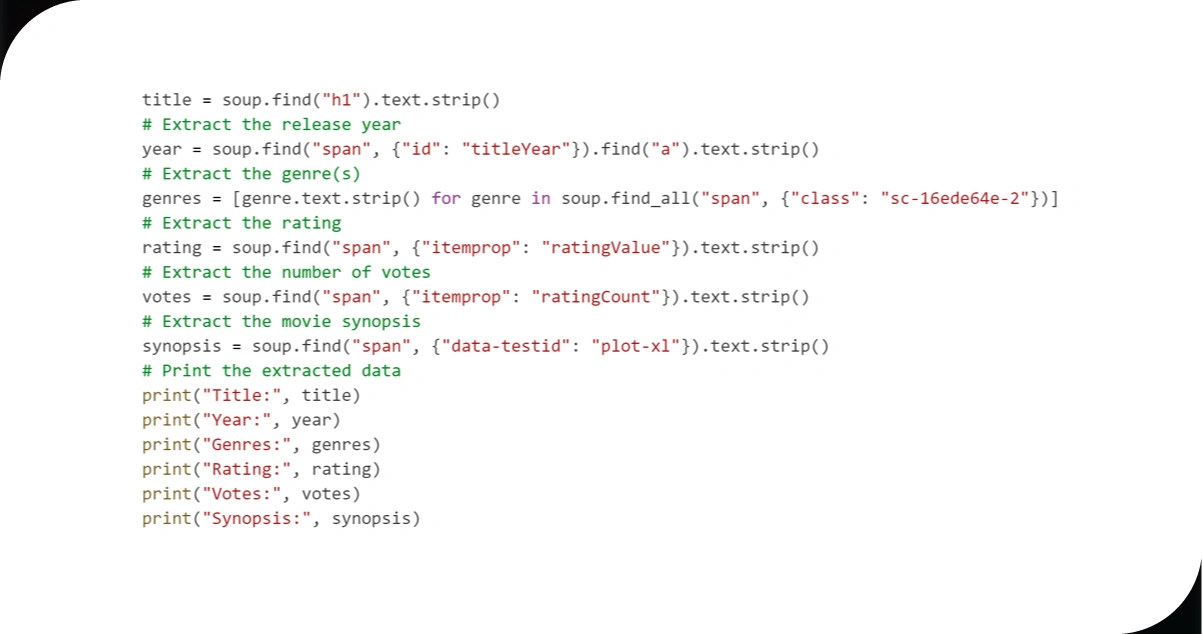
Example of Scraping Multiple Movies
If you wish to scrape multiple movies from IMDb, you can loop over a list of movie URLs and extract data from each page. Let's say you have a list of IMDb movie URLs:
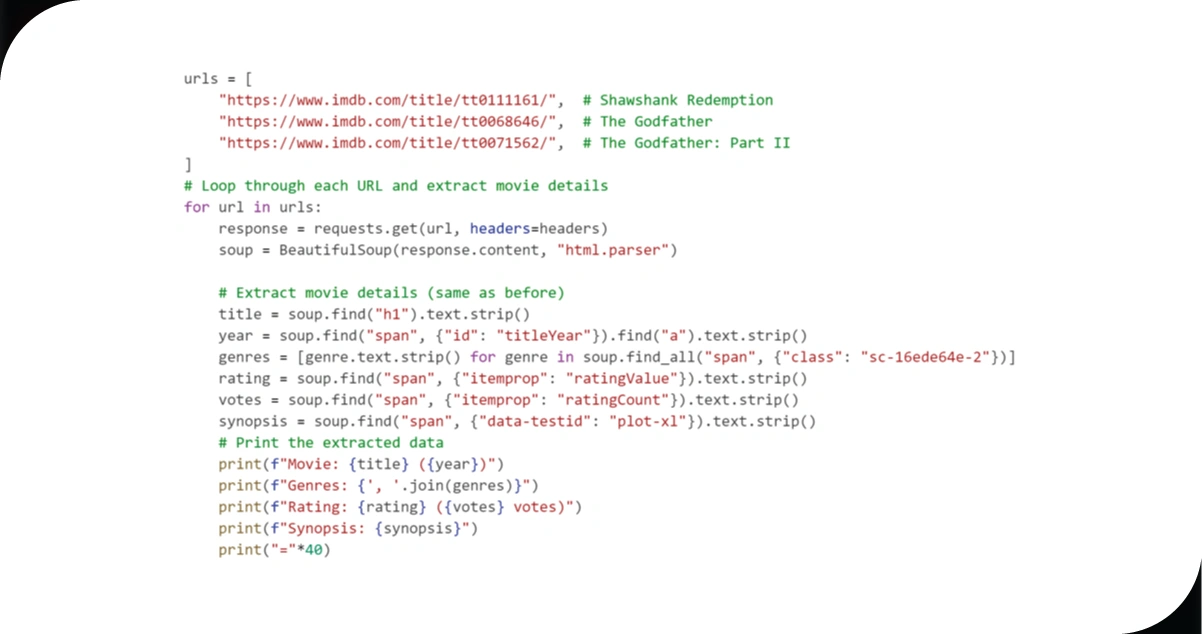
⦁ Storing Data in a Structured Format
After scraping the data, it is essential to store it in a structured format for further analysis. Pandas is an excellent library for this. You can store the scraped data in a DataFrame and export it as a CSV file.
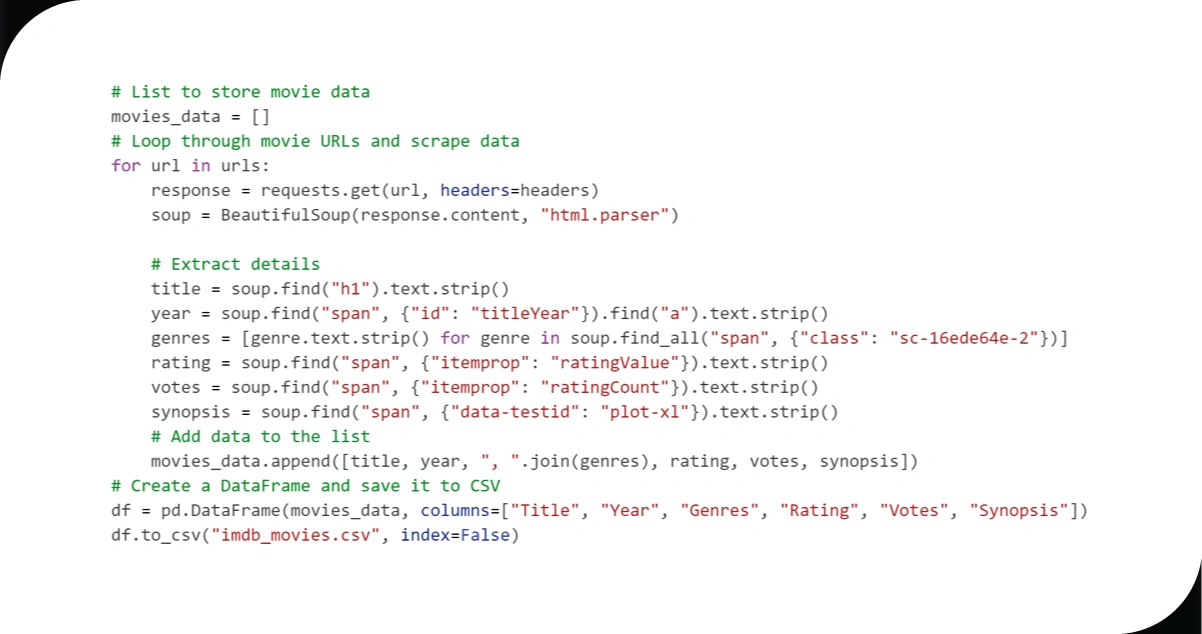
Conclusion
Web scraping IMDb data with Python can unlock a wealth of movie-related information, whether you're interested in analyzing ratings and trends or gathering data for personal projects. With libraries like requests and BeautifulSoup, Python makes web scraping accessible and straightforward. However, remember to follow ethical guidelines when scraping and always respect the terms of service of the websites you're scraping from. Focusing on key metrics allows you to track important IMDb Data KPIs such as average ratings, audience sentiment, and box office performance to gain deeper insights into movie success.
Embrace the potential of OTT Scrape to unlock these insights and stay ahead in the competitive world of streaming!
